Events
- Research Paper on ESG Scores and Their Effect on Polluting Companies After COVID-19 September 5, 2024
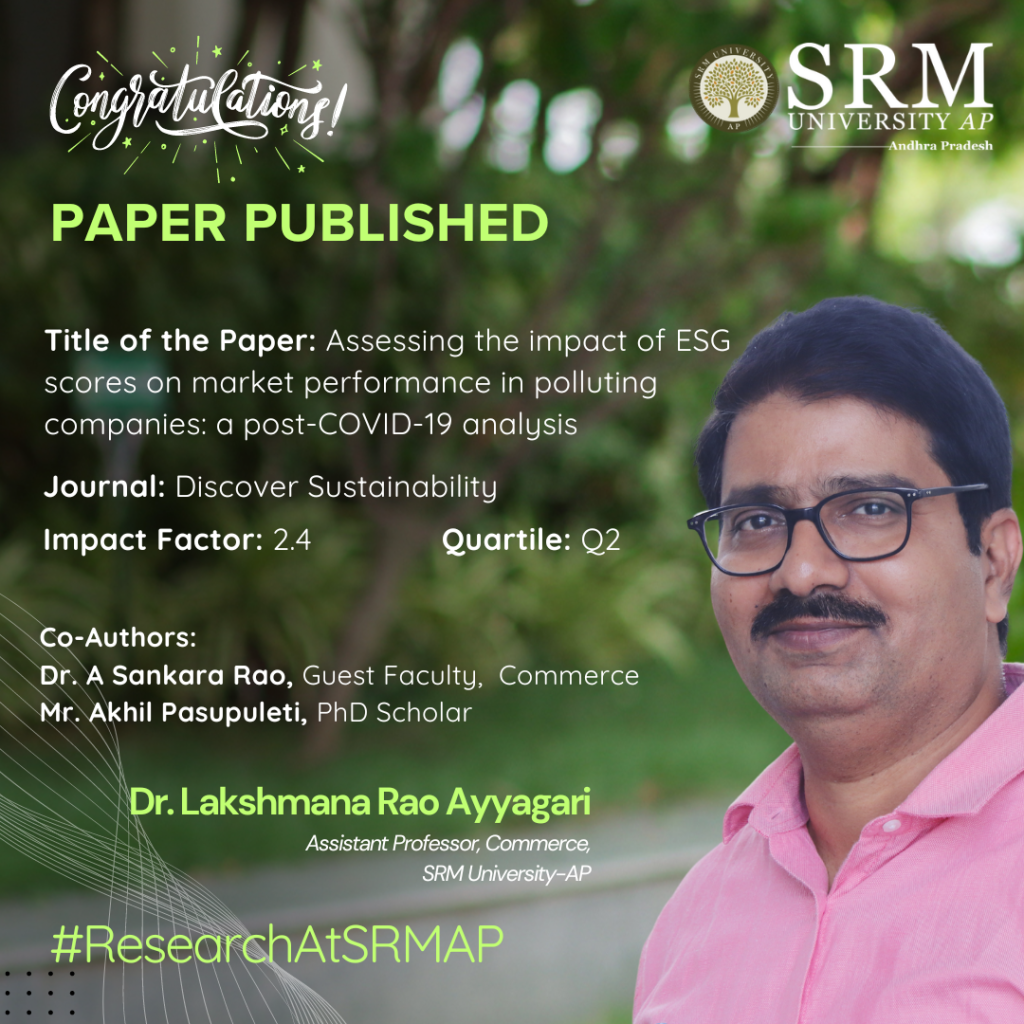
The Department of Commerce, under the Paari School of Business, is proud to present the research publication of Dr Lakshamana Rao Ayyangari, Guest Faculty Dr Sankar Rao, and Research Scholar Mr Akhil Pasupuleti. Their research paper, titled “Assessing the impact of ESG scores on market performance in polluting companies: a post-COVID-19 analysis,” is featured in the Q2 journal “Discover Sustainability.” Here is an interesting abstract of their research.
Abstract:
The study aims to unravel the impact of Environmental Social Governance (ESG) scores on the firm’s market performance of polluting companies. Moreover, the study also finds out the moderating effect of green initiatives. The study’s population consisted of 67 companies that were chosen from the list of polluting companies given by the Central Pollution Control Board of India for the post-COVID-19 timeframe of 2020–2023. The results indicate that the performance of ESG will improve the financial performance of the company.
Practical Implementation:
The analysis showed that companies with higher ESG scores generally perform better in the market. This means that firms that are more responsible in terms of environmental, social, and governance practices tend to do well financially. However, the study found that green initiatives did not have a significant impact on this relationship.
These findings are important for company managers and stakeholders. Understanding the connection between ESG practices and market performance can help managers create strategies to improve their ESG scores, ultimately boosting their financial performance.
Future Research Plans:
i) Focus on the R&D investment and sustainability.
ii) Studying the relationship between green finance and sustainability
iii) Exploring the relationship of CSR in sustainability
Continue reading → - Decoding Investment Perceptions in India: Dr Lakshmana Rao’s Recent Publication July 1, 2024
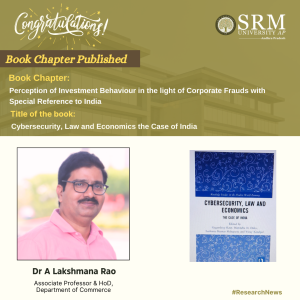 In a significant contribution to the academic discourse on corporate frauds and investment behaviour, Dr A Lakshmana Rao, Head of the Department and Associate Professor in the Department of Commerce, has published an insightful book chapter titled “Perception of Investment Behaviour in the Light of Corporate Frauds with Special Reference to India,” the chapter is a part of the book “Cybersecurity, Law and Economics: The Case of India,” published by Routledge, a prestigious Taylor and Francis Group.
In a significant contribution to the academic discourse on corporate frauds and investment behaviour, Dr A Lakshmana Rao, Head of the Department and Associate Professor in the Department of Commerce, has published an insightful book chapter titled “Perception of Investment Behaviour in the Light of Corporate Frauds with Special Reference to India,” the chapter is a part of the book “Cybersecurity, Law and Economics: The Case of India,” published by Routledge, a prestigious Taylor and Francis Group.
Dr Rao’s work delves into the intricate dynamics of investor psychology and market trust, particularly in the aftermath of corporate scandals. His research provides a nuanced understanding of how investors navigate the complex landscape of financial decision-making when confronted with corporate malfeasance.The chapter is poised to serve as a valuable resource for students, academics, and professionals interested in the intersections of finance, law, and cybersecurity. It also underscores the importance of robust legal frameworks and transparent corporate governance in maintaining investor confidence in the Indian market. With this publication, Dr Rao has made a notable contribution to the literature on economic security and investment strategies, offering a timely examination of the challenges and considerations unique to the Indian context.
A Brief Introduction of the Book Chapter
This book examines the intersection between cybersecurity and India’s law and economy and offers a course of action for designing efficacious policies against emerging cybercrimes in the country.
It reviews the boom in infrastructure growth in India and the security challenges this presents to the domestic economy and legal system. Contributors conduct a risk assessment of the potential economic impacts and security vulnerabilities, as well as identify the current regulatory and legal gaps regarding cryptocurrency, e-commerce and digital banking. The book also considers the subject of data localisation and sovereignty, and the challenges of establishing an indigenous data architecture. By discussing the economic impact of cybersecurity and incorporating recommendations from scholars, activists, academics, young legal intellectuals, and professionals in the field, the chapters propose new measures and protections for lawmakers and policymakers to adopt.Significance of the Book Chapter
The book chapter titled “Perception of Investment Behaviour in the Light of Corporate Frauds with Special Reference to India” is a survey-based study that examines the general investor’s intentions regarding their investment behaviour in various investment options and their behavioural changes in the case of corporate frauds.
Co-authors of the Book Chapter
Two co-authors, Dr G Ramakrishnan and Dr Nikhil Kulshrestha, helped conduct the research and survey.
Link to the Book Chapter publication
Publication Details (incl. Publisher, ISBN, Launch date, Edition, etc)
Continue reading →
ISBN 9781032852454
232 Pages 8 B/W Illustrations
October 1, 2024, by Routledge
Price: £ 135 - Unveiling the Post-Pandemic Tapestry of Mind and Body in Türkiye April 24, 2024
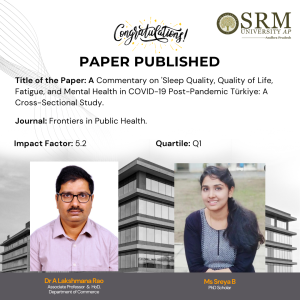 We are thrilled to announce that Dr A Lakshmana Rao, Associate Professor from the Department of Commerce along with Ms Sreya B, a distinguished PhD Scholar, have made a significant contribution to the field of public health with their latest publication.
We are thrilled to announce that Dr A Lakshmana Rao, Associate Professor from the Department of Commerce along with Ms Sreya B, a distinguished PhD Scholar, have made a significant contribution to the field of public health with their latest publication.Their paper, titled “A Commentary on ‘Sleep Quality, Quality of Life, Fatigue, and Mental Health in COVID-19 post-pandemic Türkiye: A Cross-Sectional Study’,” has been published in the esteemed journal Frontiers in Public Health, which boasts an impressive impact factor of 5.2.
This groundbreaking study delves into the crucial aspects of sleep quality, quality of life, fatigue, and mental health in the aftermath of the COVID-19 pandemic in Türkiye. The research provides insightful commentary and analysis, contributing valuable knowledge to our understanding of the pandemic’s long-term effects on human well-being.
The SRM University-AP community is proud of Dr Rao and Ms Sreya B for their dedication and excellence in research. Their work not only enhances the reputation of our institution but also serves as an inspiration for our students and faculty alike.
We congratulate them on their achievement and encourage our readers to access the full paper to learn more about the study’s findings and implications for public health.
Abstract
This commentary examines the impact of the COVID-19 pandemic on mental health and sleep quality among the Turkish population, focusing on socio-demographic disparities and gender-based differences. To investigate the lasting effects of the pandemic, a comprehensive cross-sectional, multi-center-based survey was conducted in 2022. The study used robust sampling strategies and validated assessment tools such as WHOQOL-BREF, PHQ-15, DASS-21, GAD-7, PSQI, and FAS to reveal significant associations between poor sleep quality and worsened mental health.
The findings highlight the need for targeted interventions post-pandemic. The study conducted a detailed analysis, including multivariate regression, to explore the interaction between socio-demographic factors, mental health, and sleep quality, providing valuable insights for future public health interventions that consider both socio-demographic characteristics and lifestyle factors. In conclusion, the study advocates prioritising interventions that enhance sleep quality as a crucial aspect of post-pandemic public health, offering potential avenues for mitigating mental health disorders. Despite acknowledged limitations, the research’s contributions to understanding post-pandemic mental health challenges underscore its relevance in shaping targeted public health interventions.
Explanation of the Research in Layperson’s Terms
This article discusses a research study conducted in Turkey to investigate the impact of the COVID-19 pandemic on people’s sleep, quality of life, fatigue, and mental health. The study discovered that numerous individuals experienced sleep problems and mental health disorders following the pandemic, likely due to stress and social isolation. It suggests that enhancing sleep quality could help to improve mental health in the future, emphasising the significance of addressing these issues in public health strategies.
Title of Research Paper in the Citation Format
Sreya B, Lakshmana Rao A, (2024) Commentary: Sleep quality, quality of life, fatigue, and mental health in COVID-19 post-pandemic Türkiye: a cross-sectional study. Front. Public Health 12:1393054. Doi: 10.3389/fpubh.2024.1393054
Practical Implementation or the Social Implications Associated with the Research
The findings of the research have significant practical and social implications for addressing the impact of the COVID-19 pandemic on the Turkish population. The study underscores the importance of targeted interventions aimed at improving sleep quality to mitigate long-term mental health challenges. These interventions might involve stress management programs, education on sleep hygiene, and increased access to mental health services. Furthermore, optimising healthcare resource allocation by prioritising mental health services and sleep disorder clinics could enhance support for individuals struggling with mental health issues.
Public health campaigns focusing on the importance of sleep for mental well-being could raise awareness and promote strategies for improving sleep quality across various demographic groups. Additionally, the research helps reduce stigma around mental health by highlighting the prevalence of mental health symptoms and sleep disturbances post-pandemic, encouraging more individuals to seek support without fear of judgment. Moreover, recognising the impact of social isolation on mental health and sleep quality underscores the importance of fostering social support networks and community connections to aid in post-pandemic recovery.
Policy development informed by the research findings could address broader social determinants of health, such as housing insecurity and access to healthcare, to create a more supportive environment for mental health and sleep quality improvement initiatives. Overall, integrating mental health and sleep quality considerations into post-pandemic recovery efforts is crucial for promoting the overall well-being of the Turkish population.
Continue reading → - A Study on Sustainable Organisational Development in the IoT Era January 30, 2024
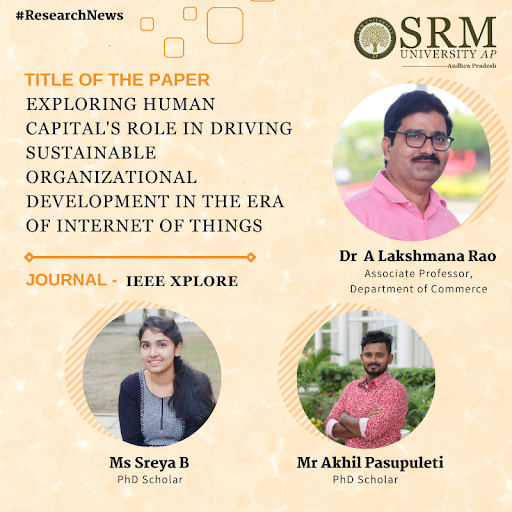 Human capital plays a crucial role in shaping an organisation’s growth in today’s digital age. It’s the idea generated by the human capital that leads to innovation. Dr A Lakshmana Rao, Associate Professor, Department of Commerce, along with his research scholars Ms Sreya B and Mr Akhil Pasupuleti, conducted a comprehensive study on human resource management in the information technology sector of Kerala. Their research paper titled “Exploring Human Capital’s Role in Driving Sustainable Organisational Development in the Era of Internet of Things” focuses on 320 participants from Kochi Infopark and investigates the impact of the Internet of Things (IoT) on their lives.
Human capital plays a crucial role in shaping an organisation’s growth in today’s digital age. It’s the idea generated by the human capital that leads to innovation. Dr A Lakshmana Rao, Associate Professor, Department of Commerce, along with his research scholars Ms Sreya B and Mr Akhil Pasupuleti, conducted a comprehensive study on human resource management in the information technology sector of Kerala. Their research paper titled “Exploring Human Capital’s Role in Driving Sustainable Organisational Development in the Era of Internet of Things” focuses on 320 participants from Kochi Infopark and investigates the impact of the Internet of Things (IoT) on their lives.Abstract
The Internet of Things (IoT), a network of interconnected devices and sensors linked through the Internet, facilitates the connection between individuals, their devices, and vast amounts of data. Within companies, the human resources department plays a crucial role in managing the pressure generated by various aspects, including marketing, development, and the application of IoT in human resources. This study is motivated by the need to understand the potential of IoT in strategic human resource management practices. To explore the fundamental strategic human resource management practices and assess their mediating effects, this research gathered data from 320 respondents in the Kerala information technology sector, specifically Kochi Infopark, consisting of both lower-level executives and senior managers. The study utilises statistical analysis to examine the relationship between sustainable human resource practices, the Internet of Things, and sustainable human resource growth. Furthermore, the study highlights the IoT’s role as a mediator between strategic human resource management practices and factors contributing to sustainable HR growth, demonstrating a positive impact of independent variables on dependent variables. These findings emphasise the potential for organisations to enhance HR practices, decision-making, and innovation using IoT during crises and uncertainties. Integrating IoT with SHRM empowers organisations to effectively manage challenges and complex environments.
Practical Implementation
a) Employee Monitoring Systems: Implement IoT-enabled employee monitoring systems using sensors and wearable devices. This allows organisations to collect data on employee activities, health, and work environments. Analysing this data helps identify patterns, optimise resource allocation, and enhance overall employee well-being.
b) Talent Management Solutions: Utilise IoT devices to gather data on employee skills, competencies, and training needs. This information is valuable for developing personalised training programs, creating career paths, and strategising succession plans. Integrating IoT into talent management aligns HR practices with evolving workforce needs, leading to improved satisfaction and retention.
c) Remote Work Solutions: In times of crisis, such as the COVID-19 pandemic, leverage IoT-enabled remote work solutions. These solutions facilitate seamless communication, collaboration, and virtual team management. Integrating IoT with HR practices enables organisations to effectively manage remote workforces, maintain employee engagement, and adapt to challenging circumstances.
Social Implications
a) Improved HR Practices: Integrating IoT with HR practices enhances decision-making and fosters innovation. This, in turn, contributes to improved HR practices, ensuring that organisations are equipped to address contemporary challenges and complexities.
b) Employee Well-being: The use of IoT in employee monitoring systems promotes a holistic approach to employee well-being. Organisations can proactively address health and safety concerns, leading to a healthier and more engaged workforce.
c) Skill Development and Career Growth: IoT-driven talent management solutions contribute to individual skill development and career growth. Employees benefit from personalised training programs, creating a positive impact on professional development.
d) Crisis Adaptability: The integration of IoT in remote work solutions demonstrates organisational adaptability during crises. This not only ensures business continuity but also highlights a commitment to employee welfare in challenging situations.
e) Technological Advancement: Embracing IoT showcases an organisation’s commitment to technological advancement. This can enhance the organisation’s image, attracting top talent and positioning it as an industry leader.
Future Research Plans
In their upcoming research endeavours, the trio will focus on unlocking the bottlenecks of IoT-driven remote work dynamics and its influence on collaboration, productivity, and employee well-being in the post-pandemic context. They also plan on exploring the impact of interconnected devices on the moonlighting behaviours of employees and employment trends in IT firms and among professionals.
We wish the trio all success in their future endeavours.
Continue reading → - A Thematic Study on Green Finance June 2, 2023
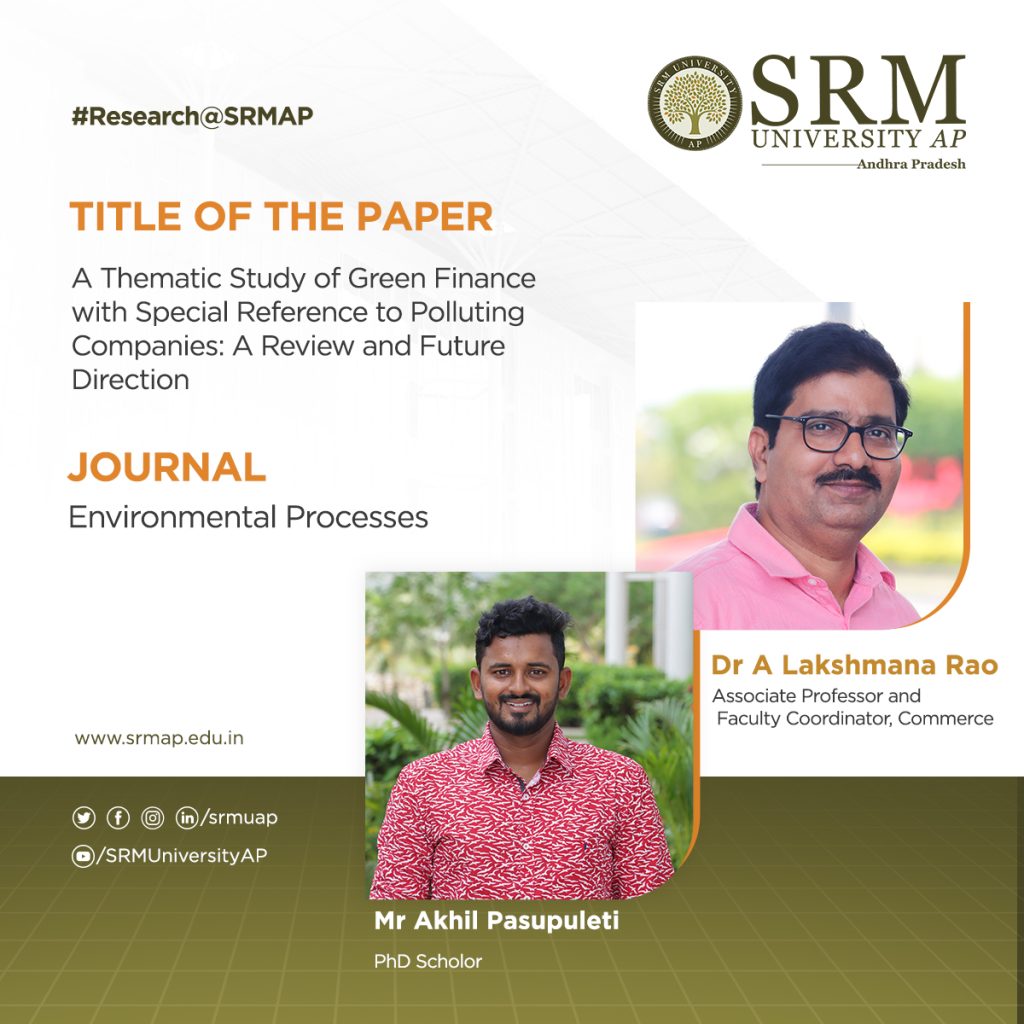 Today, we live in a world where sustainability and sustainable development are the need of the hour and amidst this, Associate Professor, Dr A Lakshmana Rao and Research Scholar, Mr Akhil Pasupuleti from the Department of Commerce have come up with their pacesetting research publication titled – “A Thematic Study of Green Finance with Special Reference to Polluting Companies: A Review and Future Direction.” The research work gives an impetus to many polluting companies to adopt green finance as an option to combat environmental pollution, this can be in the form of business strategy, energy saving, green credit, and innovation.
Today, we live in a world where sustainability and sustainable development are the need of the hour and amidst this, Associate Professor, Dr A Lakshmana Rao and Research Scholar, Mr Akhil Pasupuleti from the Department of Commerce have come up with their pacesetting research publication titled – “A Thematic Study of Green Finance with Special Reference to Polluting Companies: A Review and Future Direction.” The research work gives an impetus to many polluting companies to adopt green finance as an option to combat environmental pollution, this can be in the form of business strategy, energy saving, green credit, and innovation.Abstract
The objective of the study was to understand the phenomenon of green finance in polluting companies through a systematic literature review. The methodology involves the search, selection, classification, and categorisation of thirty-five articles on green finance in polluting companies which were analysed for the time span of eleven years, i.e., 2011–2022. The outcome of the review identified the following five themes: (i) green credit and environmental protection; (ii) green finance and green innovation; (iii) green innovation and environmental protection; (iv) green finance and investment; and (v) green innovation and firm performance. The review has put forward recommendations for further advancement in policy strengthening and the utilisation of extensive data analysis, indicating potential avenues for future research and development. The findings of the study provide insights to researchers, practitioners, and policymakers about the status of green finance in polluting companies.
Dr Lakshmana Rao Ayyagari and his student Mr Akhil Pasupuleti are working on developing future prospects of Green Finance such as ESG disclosure and reporting practices, its application and the relationship of CSR and sustainability.
Continue reading →

